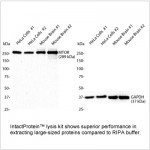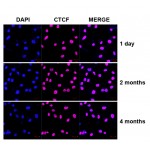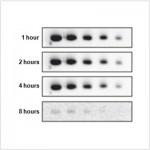| Reactivity: | Human, Mouse, Rat |
| Applications: | WB, IF/IC, ELISA |
| Host Species: | Rabbit |
| Clonality: | Polyclonal antibody |
| Gene Name: | CD209 molecule |
| Gene Symbol: | CD209 |
| Synonyms: | CDSIGN; CLEC4L; DC-SIGN; DC-SIGN1; hDC-SIGN; CD209 |
| Gene ID: | 30835 |
| UniProt ID: | Q9NNX6 |
| Immunogen: | Recombinant fusion protein containing a sequence corresponding to amino acids 265-404 of human CD209 (NP_066978.1). |
| Dilution: | WB 1:500-1:1000; IF/IC 1:50-1:200 |
| Purification Method: | Affinity purification |
| Concentration: | 0.33 mg/mL |
| Buffer: | PBS with 0.02% sodium azide, 50% glycerol, pH7.3. |
| Storage: | Store at -20°C. Avoid freeze/thaw cycles. |
| Documents: | Manual-CD209 antibody |
Background
This gene encodes a C-type lectin that functions in cell adhesion and pathogen recognition. This receptor recognizes a wide range of evolutionarily divergent pathogens with a large impact on public health, including leprosy and tuberculosis mycobacteria, the Ebola, hepatitis C, HIV-1 and Dengue viruses, and the SARS-CoV acute respiratory syndrome coronavirus. The protein is organized into four distinct domains: a C-terminal carbohydrate recognition domain, a flexible tandem-repeat neck domain, a transmembrane region and an N-terminal cytoplasmic domain involved in internalization. This gene is closely related in terms of both sequence and function to a neighboring gene, CLEC4M (Gene ID: 10332), also known as L-SIGN. The two genes differ in viral recognition and expression patterns, with this gene showing high expression on the surface of dendritic cells. Polymorphisms in the neck region are associated with protection from HIV-1 infection, while single nucleotide polymorphisms in the promoter of this gene are associated with differing resistance and susceptibility to and severity of infectious disease, including rs4804803, which is associated with SARS severity.
Images
 | Western blot analysis of lysates from THP-1 cells, using CD209 Rabbit pAb (A1466) at 1:1000 dilution. Secondary antibody: HRP-conjugated Goat anti-Rabbit IgG (H+L) (AS014) at 1:10000 dilution. Lysates/proteins: 25μg per lane. Blocking buffer: 3% nonfat dry milk in TBST. Detection: ECL Basic Kit (RM00020). Exposure time: 90s. |
 | Immunofluorescence analysis of U-937 cells using CD209 Rabbit pAb (A1466) at dilution of 1:100 (40x lens). Secondary antibody: Cy3-conjugated Goat anti-Rabbit IgG (H+L) (AS007) at 1:500 dilution. Blue: DAPI for nuclear staining. |
You may also be interested in:



